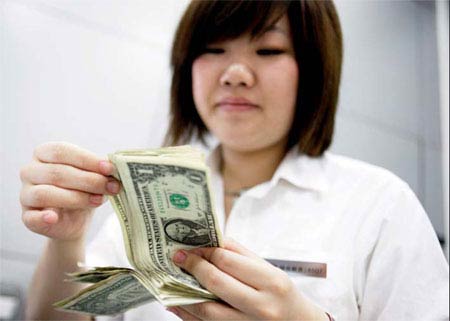Economists want China to press pause
Updated: 2011-09-23 11:46
By Cai Jing (China Daily)
Financial side effects of eurozone unknown
China must remain cautious when taking action to help the crisis-ridden eurozone, because of the continuing uncertainty over the currency bloc's prospects, economists say.
|
|
They say China - which has foreign exchange reserves of more than $3.2 trillion (2.4 trillion euros) and is attempting to diversify its stockpiles away from heavy investment in US debt - needs to wait before making firm commitments. Their comments came after Standard and Poor's downgraded Italy's credit rating and the International Monetary Fund (IMF) warned that the global economy is entering into a dangerous new phase.
| ||||
As the situation in the eurozone worsens, there is the "possibility of a disorderly fall, or, even worse, a disorderly breakdown of the European monetary union (that) would have heavy side effects for other regions in world", says Paola Subacchi, research director of international economics at the Royal Institute of International Affairs in London. "We can reasonably assume that nobody would be immune from the effects of the fall of the euro area."
The global financial crisis has entered a new and even more dangerous phase, according to Erik Berglof, chief economist and special adviser to the president of the European Bank for Reconstruction and Development. "All parties benefiting from the collective good of the global system must be prepared to contribute towards its stability."
Despite that, it could be premature for China to take the lead to save Europe, analysts says.
Commenting on media reports that Italian officials have recently held talks with their Chinese counterparts about potential investments in the debt-laden country, Yu Yongding, a former adviser to the People's Bank of China, was cautious. "China has to wait until it can see a clearer road map from the euro countries for solving the sovereign-debt problem," he told Bloomberg. The nation is not a lender of last resort for "troubled countries", he added.
Many other economists agreed. Shen Jianguang, chief Asian economist at Mizuho Securities Co Ltd, says: "In nature, the sovereign debt crisis in Europe is rooted in the internal structure of the eurozone, and the key to solving those problems lies in Europe," he says. "Investment by other countries will not solve those problems," he told Chinese media.
Liu Ligang, chief China economist at ANZ Banking Group Ltd in Hong Kong, says the country should wait until the prospects in Europe become clearer before making any decisions. "China's policy should be made after the eurozone takes strong measures, for example, setting up a 'firewall' to prevent countries such as Spain and Italy from entering a state of crisis," he says. "It would be more appropriate for China to show its hand then."
Premier Wen Jiabao has expressed China's willingness to help Europe, while Zhang Xiaoqiang, vice-minister of the National Development and Reform Commission, a top policymaking body, said at the recent World Economic Forum in Dalian that China is willing to buy euro bonds "within its capacity" from countries involved in the crisis.
Their remarks "will have a positive impact on China's image and improve the country's international influence and reputation", Shen says. However, Europe must take effective action to ease the situation first, he adds.
Moreover, making investments to help Europe could prove risky, analysts says, making it necessary for China to play safe.
"I think this (investing in European debt) is more risky as a possibility; it implies buying assets which could be substantially risky," Subacchi says.
Analysts say that, as the market panic continues to develop, the long-term interest rates of debts in European countries such as Spain and Italy could jump as high as 10 percent from the current range of 3 to 6 percent, crimping the finances of those countries and making servicing of the debt unsustainable, which in turn would affect the interests of the buyers of those debts.
China should also consider its domestic situation when making investment decisions in Europe, analysts say.
"The Chinese government would be insane" to purchase European debt because "it would make them vulnerable to massive domestic criticism for dissipating people's savings," Christopher Wood, equity strategist at CLSA Asia-Pacific Markets, told Bloomberg.
Apart from the public pressure, slowing economic growth at home could also provide ammunition for domestic critics.
On Wednesday, the IMF trimmed China's year-on-year growth forecast for 2011 to 9.5 percent from a previous forecast of 9.6 It also cut its forecast for the country's economic growth in 2012 to 9 percent from 9.5.
Meanwhile, China is facing high consumer inflation. In August, it dropped to 6.2 percent from 37-month high of 6.5 percent in July, but that was still far higher than the official target of 4 percent for the whole year.
Local government debt is another potential problem that could trigger a crisis in the coming years, analysts say.
In addition to warnings from foreign ratings agencies, a major domestic asset management company warned this week that China could face an eruption of problems concerning local government debt in 2013.
The eruption of such problems, if it happened, would deal a heavy blow to the banking system and trigger financial chaos in the world's second largest economy.
"China remains a poor country and its domestic problems are far more complicated" than those in Europe, says Dong Xian'an, president and chief economist at Peking First Advisory Co Ltd. "China is not able to become too involved in the stability of European countries."
He urges the authorities to pay more attention to solving domestic structural economic problems, instead of making risky investments overseas using the nation's foreign exchange reserves.
Zhang Haizhou in London and Wang Xiaotian in Beijing contributed to this story.
E-paper

Pearl paradise
Dreams of a 'crazy' man turned out to be a real pearler for city
Literary beacon
Venice of china
Up to the mark
Specials

Let them eat cake
Cambridge University graduate develops thriving business selling cupcakes

A case is laid to rest
In 1937, a young woman'S body was found in beijing. paul french went searching for her killer

Banking on change
Leading economist says china must transform its growth model soon


